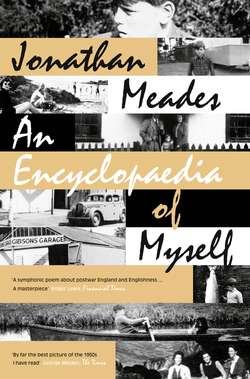Читать книгу An Encyclopaedia of Myself - Jonathan Meades, Jonathan Meades - Страница 15
BUCKHORN WESTON
ОглавлениеWe travelled to a rugby match by stopping train. I loved that journey. Trying to calculate the very point where, above the deep cutting after Wilton South station, the Lush family’s house was. The Nadder valley’s reduced palette – grey woodsmoke, black skeletal trees, brown hillocks, hints of hidden combes. After Semley the landscape changed, shed all intimacy. Big fields; heavy west country plough; Buckhorn Weston, up a slope to the north of the track. (When I returned home that evening I pored over the map till I’d identified its name.) It appeared to be a village of stone houses the memory of whose prettiness I all but destroyed for a time thirty-five years later when I was meant to be doing something else but noticed a signpost and negligently diverted to it. I found a group of galvanised byres and garaged tractors. I cursed myself for having gone back. Never go back. Truism or true? But I had never gone in the first place. I willed the early memory to re-establish its primacy. Gradually it did so, and my Buckhorn Weston today is that of over half a century ago: a snapshot through a third-class window. A modest mnemonic triumph, the victory of the distant past over the recent. We steamed through Templecombe, close to Posty’s birthplace. Milborne Port is not a port, can never have been a port. There’s no river. It was a cloth town and glove town. Some cottages have almost entirely glazed upper storeys to admit light so that weavers might see to weave. (Not enough, they still went blind.) We walked from Sherborne station past the Victorian–Jacobean Digby Hotel, an impressively grand establishment for a small town, then entered the Middle Ages, all ironstone cloisters and pointed arches. It was only by proximity that Sherborne Preparatory School was attached to the public school which, given the former’s moral squalor, would have doubtless preferred to detach itself: for the moment it turned a blind eye. The premises were barrack-like, of no merit. The school’s distinction derived from its being the fiefdom of the Lindsay family whose motto was Dieu et Mon Droit du Seigneur. The ownership and, with it, the headmastership passed from one churchy generation to the next. The then headmaster’s son, Robin Lindsay, was, in the century’s late fifties, in his early thirties. He cannot have believed his luck in being born into such a dynasty, into such a milieu, into such a plenty of prepubescent flesh: a carnivore’s paradise, temptation was just a wet towel’s flick away. He was evidently sated by the sight of ‘his’ naked boys in the showers, fed up with the sameness of his diet. Christopherson, Webster, Sheriff, Barry, Rose … even had they been masked he would have been capable of identifying them by their genitalia, which were on the very point of making the big leap. Visiting school teams offered variety. As a special feast for himself he organised an annual seven-a-side tournament for sixteen schools. Post-match he processed slowly beside the communal showers and cast the expert, appreciative eye of the true professional over the fresh flesh: a beauty contest of unwitting participants staged in water that was now freezing, now scalding. In 2006 a notice inside the door of Sherborne Abbey announced that ‘Choirboys are available for £10’. Tradition in action.
